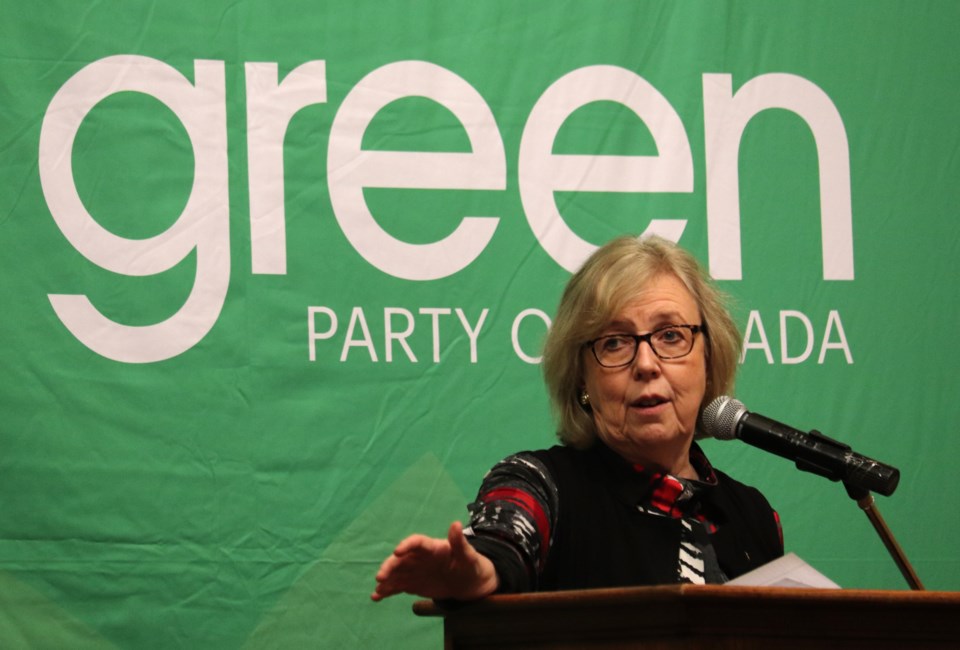Elizabeth May’s departure as the federal Green party leader is a loss and a gift. If, as the saying goes, 80 per cent of life is showing up, it is also true that 80 per cent is knowing when to leave.
May led a movement but stayed too long and hindered it. To start, though, let’s lay down laurels upon which she can rest.
I first caught her drift as the Sierra Club Canada leader, back in my Ottawa years when the environmental focus was more on pollution than on climate change, and she was nothing short of ferocious in summoning and garnering habitual attention. May was by no means straight out of Central Casting. It helped her narrative that she had advised (gasp!) a Conservative environment minister and resigned in principle.
She handily won Green party leadership in 2006 and ran unsuccessfully for office in Ontario that year. May allied, sort of, with Stéphane Dionfor the 2008 campaign, and his Liberal party did not run a candidate against her in Nova Scotia. She didn’t win the seat even though she won national attention in the federal leaders’ debates. She would come to B.C. and win in 2011 — when, strangely, she was prohibited from the debates.
(A personal aside: Indirectly, I suppose, it can be said May caused dubious institutional reform when I was CBC ombudsman. The Radio-Canada ombud, now Quebec’s lieutenant-governor, and I wrote that May should be in the 2011 debates. This infuriated the organization and began a process to shrivel the job’s mandate, now among the western world’s weakest.)
In the Commons, in its committees and certainly in its foyer at the microphone, May has been pretty much what you’d expect from someone who believes Rome is burning and we are fiddling. Her shtick is part science, part outrage and part urgency, and it has been both her blessing and her curse to be the go-to person on the file because she is almost never the go-to person on anything else.
She has, ahem, misspoken — comparing Stephen Harper’s climate change stance to Nazi appeasement, stepping into a trap door on the abortion issue, linking Wi-Fi to cancer and insect disappearance, tweeting initial support for Jian Ghomeshiand getting into her cups at a Parliamentary Press Gallery dinner in welcoming Omar Khadrback from Guantanamo Bay. She has walked back much of this, which is more than you can say about many.
The singular prominence on climate change, even as a major campaign issue, hasn’t provided the platform for growth. The between-election poll spurt sputters on vote day. May helped define the climate change issue for Canadians, but the issue also defined her — and, it can be said, limited her. The Greens’ problem on climate change has been eerily similar to the former Reform party’s on fiscal responsibility: those danged Liberals take an absolute position, dilute it, appropriate it and subdue the upstarts. Absent a big issue, the newbies stall. In the case of the Reformers, they morphed and amalgamated; in the case of the Greens, they might yet.
The climate change challenge May’s successor faces is the same one provincial leader Andrew Weaver’s successor confronts: how to politically allocate evidence, emotion, environment and the economy. Finding equilibrium has been elusive, mainly out of fear of what tackling climate change would mean for our standards of living.
The party’s larger challenges involve a stronger occupation of its principles on social justice and participatory democracy, and in that regard it will likely require as leader someone in a different subject position than May or Weaver. It might be necessary, too, to take one step back before taking two ahead – to build momentum in regions before again tackling a national campaign it clearly cannot yet muster. But whoever steps forward has what stock pickers would call a strong buy, if with an asterisk. The galvanizing environmental issue is theirs to own, the traditional left-of-centre NDP vote is aging out, and the historic governing parties are bound to be uncomfortable and vulnerable if they can’t resolve the systemic inequalities of a socially progressive country.
But who is this leader who can capitalize on the opportunity? The name escapes me.
Kirk LaPointe is editor-in-chief of Business in Vancouver and vice-president, editorial, at Glacier Media.
— Kirk LaPointe, Business in Vancouver



